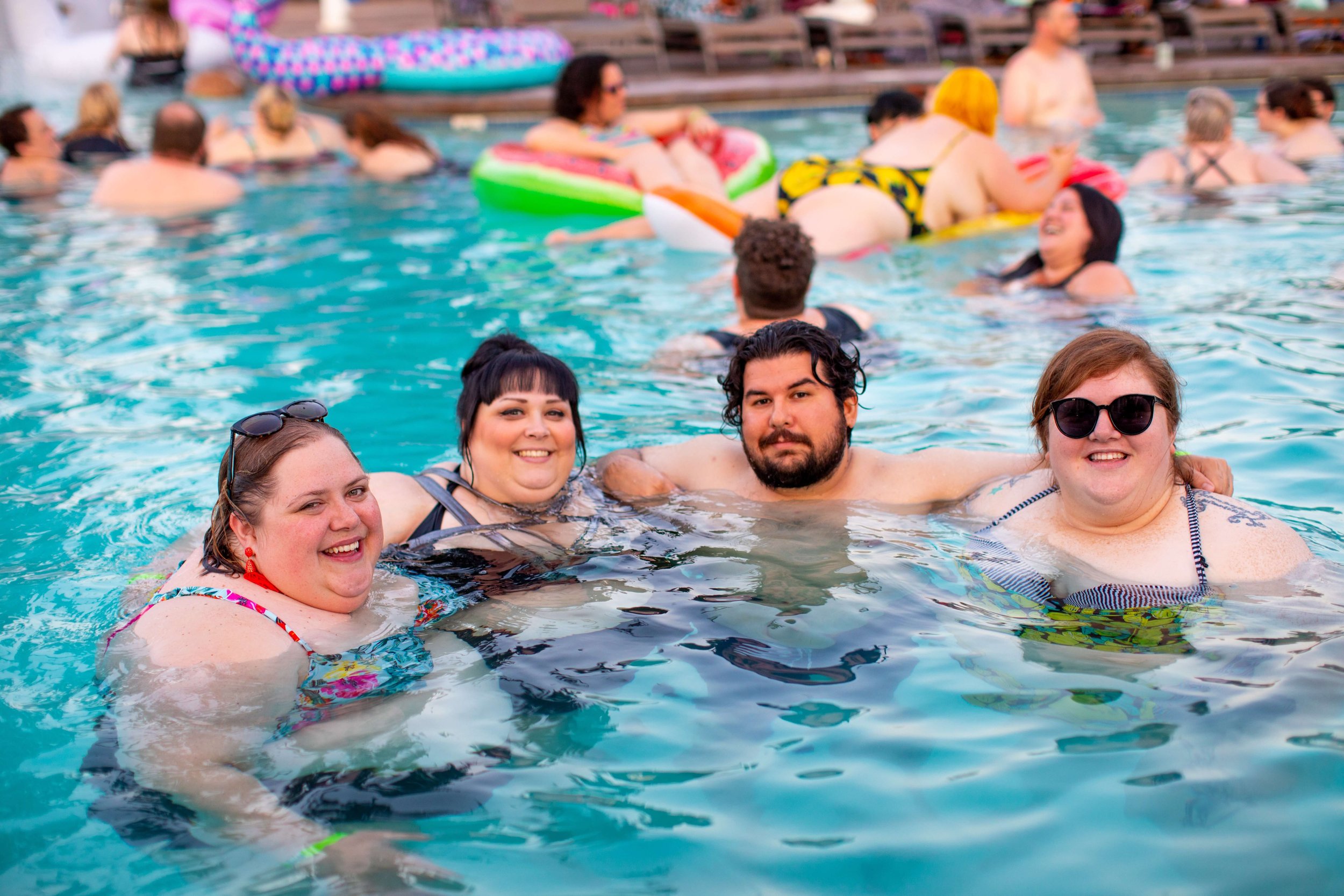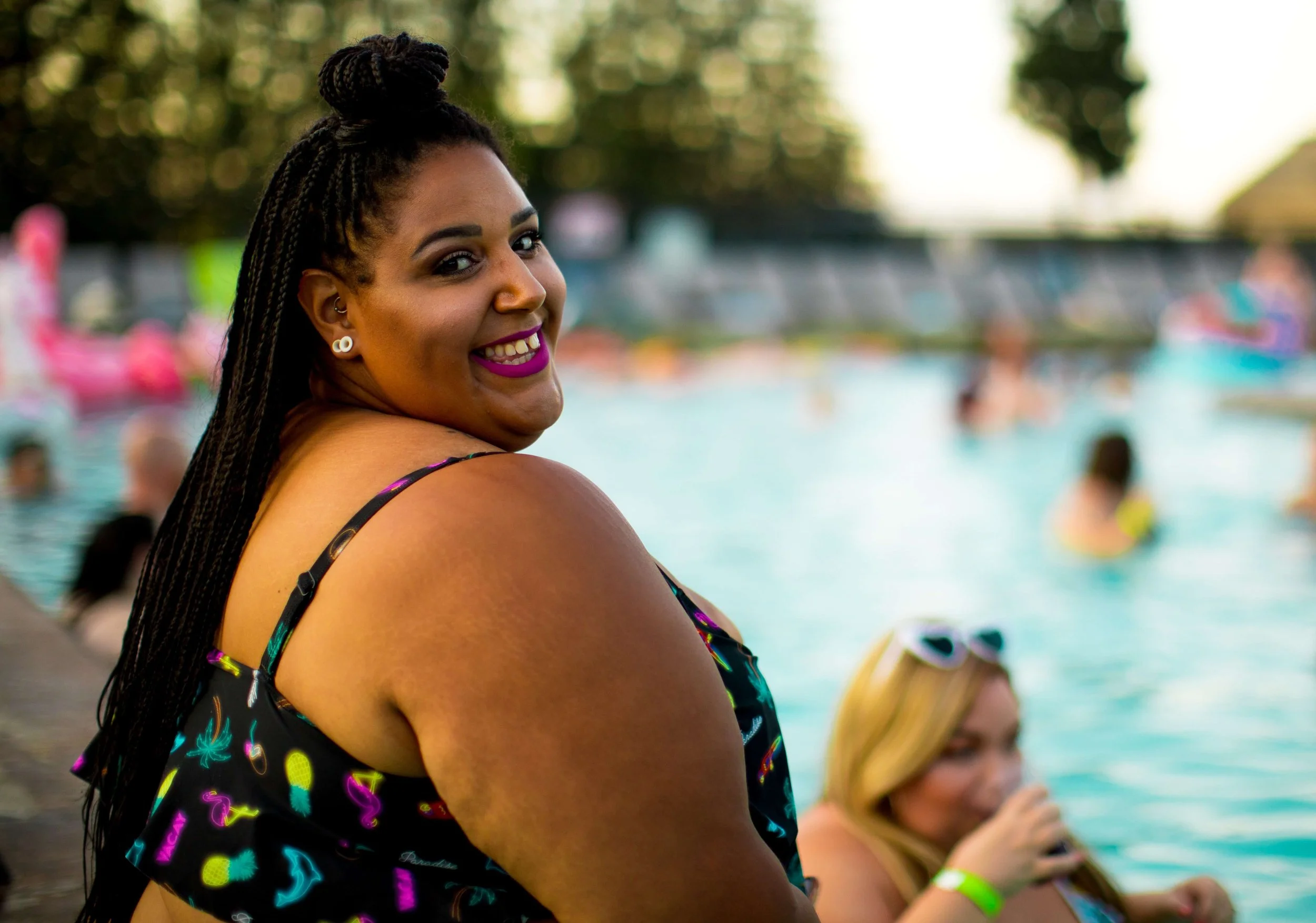Can I Be Fat and Have Anorexia? Atypical Anorexia Explained
By: Lindsay Hodgson, MSN, RDN, CD
You’re feeling like thoughts of food consume most of your headspace.
You’ve been following a diet for a while now, and you’ve noticed your eating has become more restrictive over time. You're thinking about your body a lot and can identify with having poor body image. Maybe you’ve lost some weight or maybe the scale hasn’t budged.
Either way, you’re concerned about your eating behaviors and body image. You know something doesn’t feel right. You’re wondering, “hmmm this kind of feels like anorexia…” But then you think, “no, that can’t be it. I’m not thin enough.” Or, “Can’t be. I haven’t lost a lot of weight.”
We are here to tell you that actually, yes, it is possible you have anorexia. Read on to find out why.
What is Anorexia Nervosa?
While many people have a general idea of what anorexia is, the following are the criteria for an anorexia nervosa diagnosis:
One follows a restrictive eating pattern where they are eating significantly less calories than their body needs to function, which leads to a significantly low body weight for the person’s age, sex, stage of development, and physical health.
One has strong fears of weight gain or becoming fat (despite being underweight)
One has body image struggles, criticizes themselves based on their body shape/size/weight, and may deny the seriousness of their low body weight.
Notice how often in these criteria the word “weight” shows up. Anorexia and anorexia treatment are understood with the assumption that if you have anorexia, you have a low body weight or are underweight. And yet, often that’s not the case.
What is Atypical Anorexia?
In medical settings and with older approaches to eating disorder treatment, the term atypical anorexia is used to describe a case of anorexia in a person who meets all the criteria for a diagnosis, but they are not underweight. If this seems to match your experience, you may have experienced significant weight loss in a short period of time (which is dangerous), but your weight is considered “normal,” “overweight,” or, “obese.” In other words, you are deeply struggling with an eating disorder, but no one would know by looking at you because you don’t have the thin, emaciated look that our culture tends to associate with anorexia.
According to the National Eating Disorders Association (NEDA), the medical and psychological impacts of people struggling with anorexia are the same regardless of whether it would be classified as “typical” or “atypical” anorexia. While there is data to support that anorexia is destructive regardless of body size, “atypical anorexia” continues to be used in medicine, nutrition, and psychology.
At Bravespace Nutrition we don’t use the term “atypical anorexia” because we believe it is not representative of the experiences of those struggling with anorexia. “Atypical anorexia” is a way weight stigma shows up in the eating disorders field. It sends the message that it is abnormal to exhibit symptoms of anorexia in a larger body, which minimizes people’s experience and stops people from getting help and support. And, “Atypical anorexia” is not atypical at all. Anorexia occurs in all sizes of bodies, even bodies society considers “overweight” or fat*. Your experience with anorexia is valid. You can be fat and have anorexia. You deserve anorexia treatment regardless of your weight.
What is Weight Stigma?
Weight stigma occurs when someone is discriminated against or stereotyped based on their weight. Diet culture and weight stigma go hand in hand, where thinness is celebrated and people in larger bodies face oppression. Consider the many ways that exemplify that the world caters to people in smaller bodies: limited clothing sizes at major stores, chairs at a waiting room or on an airplane, hiring discrimination, assumptions about intelligence or fitness, or Body Mass Index categories at the doctor’s office.
Weight stigma shows up in these systemic ways from institutions, and yet it is also experienced in the interpersonal moments where someone makes an insulting comment, intentional or unintentional, about weight. Another key aspect about weight stigma includes assumptions like the misled belief that a larger body equates to a less healthy body.
According to the NEDA, weight discrimination is more common than gender or age discrimination. Weight stigma has a strong role in increasing body dissatisfaction, which is a major catalyst for developing an eating disorder.
With that in mind, weight stigma is detrimental to people’s health: physical, emotional, mental, and social health. And, it is especially relevant when we talk about anorexia in larger bodies.
How does weight stigma harm those in larger bodies that need eating disorder help?
It may be hard to tell the difference between restrictive dieting and anorexia. In diet culture, people in larger bodies are expected to be pursuing weight loss, even through dangerous methods. If you are in a smaller body and following a restricted calorie diet, you may have some concerns raised. But the same often isn’t true if you’re in a larger body, where eating less in the name of weight loss is not only normal, but it can be forced upon you (and rewarded).
Perhaps you started a diet that has turned into long-term restrictive eating. While you were just carrying on and doing what you thought you “should” be doing, you may not have realized you could in fact have anorexia. In general, the line between restrictive eating and anorexia is blurry, but it is especially gray and often overlooked in folks with larger bodies. If your diet is restrictive and you are struggling with body image, chances are high that you have anorexia even if you think you’re not thin enough.
Healthcare professionals, and others, may invalidate a larger bodied person’s experience of anorexia. Admitting you need support is not easy, and weight stigma may have made it exponentially harder for you. Maybe you’ve expressed concern about your eating behaviors to a medical professional, or even a friend or family member, and been dismissed. It is completely understandable that you have kept your struggle with anorexia to yourself because you are not sure if others will believe you. I’m sorry if you were dismissed or not believed in the past. This is a cultural problem and has no reflection on you and how much you deserve eating disorder help and support.
People with anorexia in larger bodies, even when recognizing they need support, don’t think they are “sick enough” or “thin enough.” Since body diversity exists, every body will respond to restrictive eating differently, where some people will drop to a low body weight, while many others won’t. Anorexia will look different in different bodies, so you often cannot tell if someone has an eating disorder by looking at them. The same goes for malnutrition. In hospital settings dietitians perform special physical exams on patients to determine if they are at-risk for malnutrition. Dietitians conduct these exams on patients of all sizes because people can be malnourished at all body sizes or weights.
Even though it is true that anorexia and malnutrition can exist in all body sizes, society is unfortunately slow to recognize it. So it makes total sense if you’re doubting your experience with anorexia or aren’t getting recognized for struggling. Nevertheless, the notion of being “thin enough” to warrant treatment is extremely problematic.
Healthcare professionals miss an anorexia diagnosis. The idea that anorexia can be present in any body size is sadly still radical in many circles and spaces. Since the diagnosis criteria for anorexia is so underweight-centric, anorexia won’t cross many doctors or healthcare professionals’ minds unless their patient matches that weight presentation. Two people could have the same eating behaviors, but someone in a smaller body will be referred for anorexia treatment even when both are worthy of care. If you’ve had the experience of being overlooked for anorexia at the doctor, it is a clear instance of weight stigma and has no bearing on you being worthy of treatment.
Healthcare professionals, and others, praise weight loss. The way weight loss is celebrated is incredibly harmful. In addition to missing a diagnosis, healthcare providers may encourage someone’s anorexia in commenting about a larger bodied person’s significant weight loss. Doctors’ comments like, “wow, you’re down X pounds from last time. Your diet really must be “working” or, “you’re taking charge of your health” are said without a second thought. This plays out in social circles too. Consider the impact of saying, “You look great, have you lost weight?” to a friend who has anorexia. In diet culture, most people see weight loss as a positive thing, but it could be occurring in the context of an eating disorder. If you’re wondering if your weight loss and methods for achieving it are not “healthy” for you, you are not mistaken.
For all of these reasons, weight stigma invalidates the experience of people with anorexia in larger bodies. This can delay treatment, make accessing appropriate eating disorder providers more challenging, and introduce other systemic barriers due to weight-centric healthcare. This is not okay. Weight stigma needs to be a part of the conversations around anorexia, disordered eating behaviors, and healthcare in general.
If you think you have anorexia or anorexia symptoms, you deserve treatment for anorexia that affirms your experience and provides the support you need. Please consider taking a step such as reaching out to a trusted person in your life, contacting an organization for support, or scheduling a discovery call with one of our eating disorder dietitian nutritionists to initiate the process of recovery and healing your relationship with food.
You’ll also love…
Are you suffering with “atypical anorexia” and are ready to get virtual nutrition support to heal from the eating disorder?
No matter what your body size is, you deserve support. Atypical anorexia is more common than “typical” anorexia and even the name “atypical anorexia” carries with it so much weight stigma. No matter how well you think you are, if things feels hard and chaotic with food, you deserve support. Anorexia nervosa doesn’t just happen to people in thin bodies. The eating disorder dietitian nutritionists at Bravespace Nutrition in Seattle WA want to support you virtually to recover from the eating disorder. Learn more about Bravespace Nutrition, our philosophy, and the services we offer.




